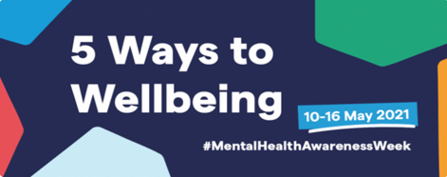
Mental Health Awareness Week: 5 Ways to Wellbeing

An average of 1 in 4 people a year in the UK experience problems with their mental health. The aim of Mental Health Awareness Week is simply to talk about our mental health and make sure that people know it’s better to talk about it and to ask for help, because suffering in silence is never the answer. Mental health awareness week 2021 takes place from the 10th to the 16th of May 2021, and this year it focuses on the 5 ways to wellbeing (which are key to improving our mental health) and reconnecting with nature.
The 5 ways to wellbeing are:
1. Connect
2. Be Active
3. Take Notice
4. Keep Learning
5. Give
Connection is having people to talk to, to laugh with, to make memories with. Connection to others is crucial to our wellbeing, as loneliness or isolation can have an extremely negative effect on our mental health. Connection is about supporting each other, making sure that there is always someone that you can rely on when you need help.
Also important, linking into this year’s theme, is connection to nature, which benefits both our wellbeing and nature itself. It is a proven fact that bringing nature into our lives by spending time out in green spaces improves our mood, calms us and reduces stress. Growing food or flowers, gardening, relaxing outside and interacting with the surrounding wildlife are all ways in which everyone can connect to nature. Additionally, your local wildlife trust has a range of activities you can try, which vary from volunteering to going on organised walks.
Regular physical activity is known to reduce depression and anxiety across all age groups. Being active doesn’t mean loving sport, running miles and miles, or going to the gym every day. It’s about finding something you enjoy, that suits you, which can be as simple as walking your dog, going for a run in the local park or going on a short bike ride. When you exercise, your body releases chemicals called endorphins that, among other things, trigger a positive feeling in your body. When being active outdoors, you can also enjoy the fresh air and natural sunlight.
As we walk, though we are surrounded by nature, many of us don’t notice it. Or, maybe we notice it, but we don’t appreciate it. We walk through a park, or a forest, and we just walk, maybe listening to music, or talking to a friend. Next time you’re out for a walk, stop for a second, hit the pause button, look around, take notice of the small things that have always been there but you haven’t seen before. See if you can spot something new or different each time you go out. Listen to the birds around you and just relax for a second. Stop thinking, focus on your surroundings and savour each moment.
Learning is not just for students, and should not be kept for school hours. Learning something new every day is good for our brain. Widening our skill set can improve our confidence, give a sense of accomplishment and is always something to feel proud of. Learning doesn’t have to be long and boring either, learn about something that brings you joy and happiness, or, in light of Mental Health Awareness Week, educate yourselves about mental health and how to give support to those who need it, because you never know who around you could be struggling with their mental health.
Giving back, helping out or just doing something nice for someone else can give us a positive feeling and boost our own wellbeing. Giving back could also mean giving up your free time to volunteer, donate to a charity or help keep the environment around you clean. This could be by litter picking in your local area, going on organised beach cleans, making sure to recycle or buying seasonal food, which all help the environment and mean that more people will be able to enjoy it in the future. Giving in this way benefits, and brings happiness to, the people you choose support and also promotes a feeling of happiness and accomplishment too.
It is clear that nature is crucial to our wellbeing and mental health. When we are surrounded by nature, or even connected in the smallest ways, we are happier, calmer, and feel more content with life.

